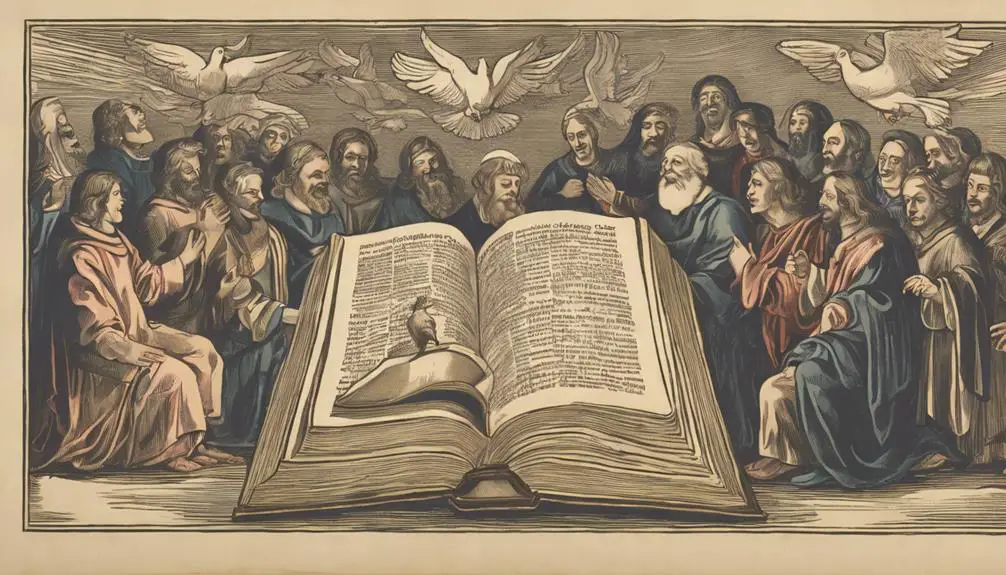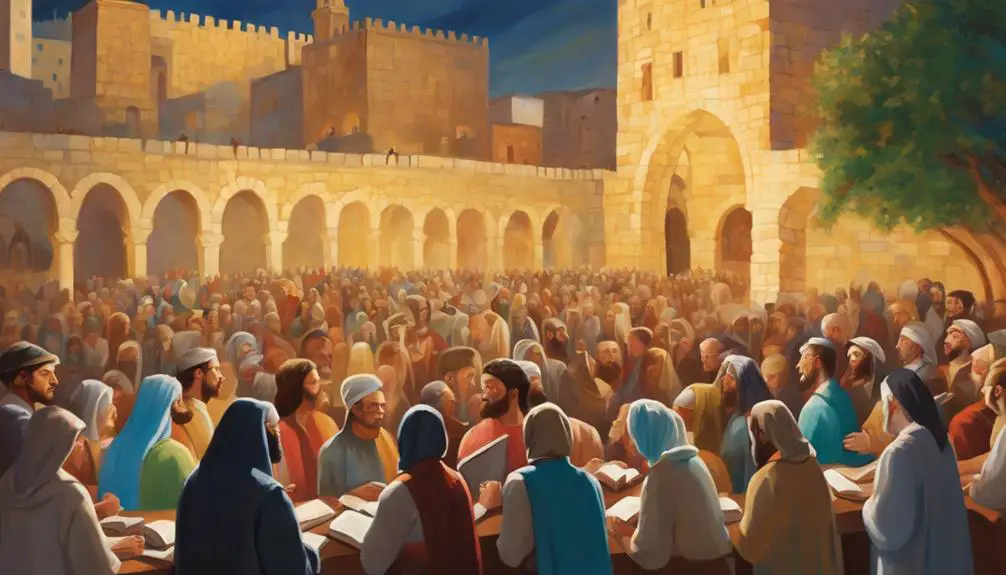Gather profound insights from our exploration of 'Acts 2 Bible Study Questions and Answers' as we delve into faith, history, and divine intervention.

Acts 2 Bible Study Questions and Answers
Have you ever wondered about the true significance of the events narrated in the second chapter of Acts? You're not alone. This chapter, highlighting the Pentecost and the beginning of the early church, often sparks curiosity and raises numerous questions.
Let's examine the complex nuances of Peter's sermon, the crowd's response, and the critical role of the Holy Spirit. As we dissect this chapter, we'll dive into a riveting exploration of faith, history, and divine intervention.
Ready to uncover some intriguing insights? Stay tuned.
Key Takeaways
- The Pentecost marks the birth of the early church, fulfilling Jesus' promise of sending the Holy Spirit for guidance and empowerment.
- Peter's sermon at Pentecost used Old Testament prophecy to emphasize Jesus' identity, triggering a transformative response among the listeners.
- The early church, formed after Acts 2, emphasized communal living, with believers sharing possessions, meals, and prayers.
- The Holy Spirit played a pivotal role in the early church, empowering believers to preach, perform miracles, and experience divine wisdom and revelation.
Understanding the Pentecost

Often, to truly grasp the significance of the Pentecost, you must delve deeply into its historical and theological underpinnings. This event, recorded in the second chapter of Acts, represents a pivotal moment in Christian history. It's the occasion when the Holy Spirit descended upon the disciples, signifying the birth of the church as we know today.
Undeniably, the Pentecost has profound theological implications. It's the fulfillment of Jesus' promise to send a 'Comforter' or 'Helper' to his disciples, as mentioned in John 14:26. This Spirit-guided empowerment marked a shift in God's interaction with humanity, transitioning from a divine presence in a physical temple to an indwelling within believers themselves.
Historically, Pentecost also highlights the inclusivity of the Christian faith. The disciples, filled with the Holy Spirit, began speaking in various languages, reaching a diverse crowd. This act shattered cultural and linguistic barriers, reflecting the universal reach of the gospel.
In essence, understanding the Pentecost requires a discerning look into its historical context and theological implications. It's not just about a miraculous event; it's about the establishment of a faith that transcends boundaries, and the promise of a divine presence that dwells within each believer.
Peter's Sermon Dissected

While delving into Peter's sermon in Acts 2, you'll find a profound exposition of the gospel message, marked by its theological depth and rhetorical prowess. Peter's sermon, delivered shortly after the Holy Spirit descended upon the apostles, stands as a cornerstone of early Christian preaching. It's a masterful blend of Old Testament prophecy and New Testament revelation, seamlessly woven together to convey the transformative reality of Jesus Christ.
Peter's sermon hinges on two key points: the resurrection of Jesus and the fulfillment of prophecy. He boldly proclaims Jesus as both Lord and Christ, substantiating his claims with passages from Psalms and the prophet Joel. Peter's use of these texts isn't random; he strategically employs them to underscore Jesus' divine identity and mission.
The sermon's structure, too, merits attention. Peter begins by addressing the crowd's perplexity over the apostles' strange behavior, then transitions to the heart of the gospel. This strategic approach demonstrates Peter's keen understanding of his audience and underscores the importance of context in delivering a convincing message. His sermon serves as a blueprint for Christ-centered preaching, navigating theological complexities with clarity and conviction.
The Response of the Crowd

In examining the crowd's reaction to Peter's sermon, it's crucial to recognize the profound impact his words had on the listeners, as evidenced by their immediate, emotionally charged response. This response showcased a deep conviction and marked a significant turning point in their understanding of Jesus Christ and His teachings.
Let's break down their reaction as recorded in Acts 2:37: "When the people heard this, they were cut to the heart and said to Peter and the other apostles, 'Brothers, what shall we do?'". This reveals two essential aspects of the crowd's response: their emotional anguish and their desperate need for guidance.
Emotional Response |
Need for Guidance |
|---|---|
Cut to the heart |
'What shall we do?' |
Profound remorse |
Seeking direction |
Recognition of sin |
Desire for redemption |
This analytical study of the crowd's response facilitates a comprehensive understanding of the transformative power of Peter's sermon. It was not merely a passive listening experience for the crowd but a catalyst for active introspection and a subsequent call to action. The depth of their reaction – emotional, cognitive, and behavioral – underlines the effectiveness of Peter's sermon and its profound influence on the early Christian community.
Role of the Holy Spirit

Peter's sermon not only catalyzed a deep emotional response within the crowd but also illuminated the critical role of the Holy Spirit in guiding believers towards redemption. The Holy Spirit, as portrayed in Acts 2, is the divine catalyst for transformation and empowerment.
You see, the Holy Spirit's role is multifaceted, but primarily, it functions as a guide and enabler for believers. It's the Holy Spirit that emboldens the disciples to preach the Gospel fearlessly, turning them from timid followers into powerful evangelists. It's through this divine influence that they're able to perform miracles and speak in tongues, serving as irrefutable proof of God's power and presence.
The Holy Spirit also acts as a conduit for divine interaction and communication. It's through the Spirit that God speaks to His people, providing them with wisdom, revelation, and prophetic insight. It's the Spirit that convicts the hearts of believers, leading them towards repentance and righteousness.
Essentially, the Holy Spirit is the force that empowers, directs, and unifies the body of Christ. Its role as depicted in Acts 2 underscores its critical importance in the life and mission of every believer. Understanding this helps you to appreciate the profound impact the Spirit can have on your faith journey.
Formation of the Early Church

Often overlooked, the formation of the early church, as depicted in Acts 2, reveals a monumental shift in religious history, where believers were united under the banner of Christianity and began to live out the teachings of Jesus in a communal, transformative way. This unity wasn't just a surface-level agreement; it was a deep, life-altering commitment that radically changed their understanding and practice of faith.
This new community, known as the church, practiced a form of communal living, shared their possessions, and devoted themselves to teaching, fellowship, breaking of bread and prayers. These aren't just historical facts, they're pivotal elements in the story of the Christian faith.
Here's a table to give a snapshot:
Aspect |
Description |
Reference in Acts 2 |
|---|---|---|
Community |
Believers lived together |
Verse 44 |
Sharing |
Possessions were held in common |
Verse 45 |
Teaching |
Devotion to apostles' teachings |
Verse 42 |
Fellowship |
Regular meetings and meals |
Verse 46 |
Prayer |
A focus on collective prayer |
Verse 42 |
Thus, the formation of the early church isn't just a historical event, it's a model of Christian living that's as relevant today as it was then.
Conclusion
In analyzing Acts 2, you've delved into the significance of Pentecost.
You've dissected Peter's sermon, observed the crowd's response,
recognized the Holy Spirit's role, and traced the early Church's formation.
You've stepped into the shoes of the early Christians,
grasping the transformative power of the Holy Spirit and the birth of the Church.
It's essential to carry these insights forward,
influencing your understanding of Christianity's core principles
and its profound historical context.



Sign up